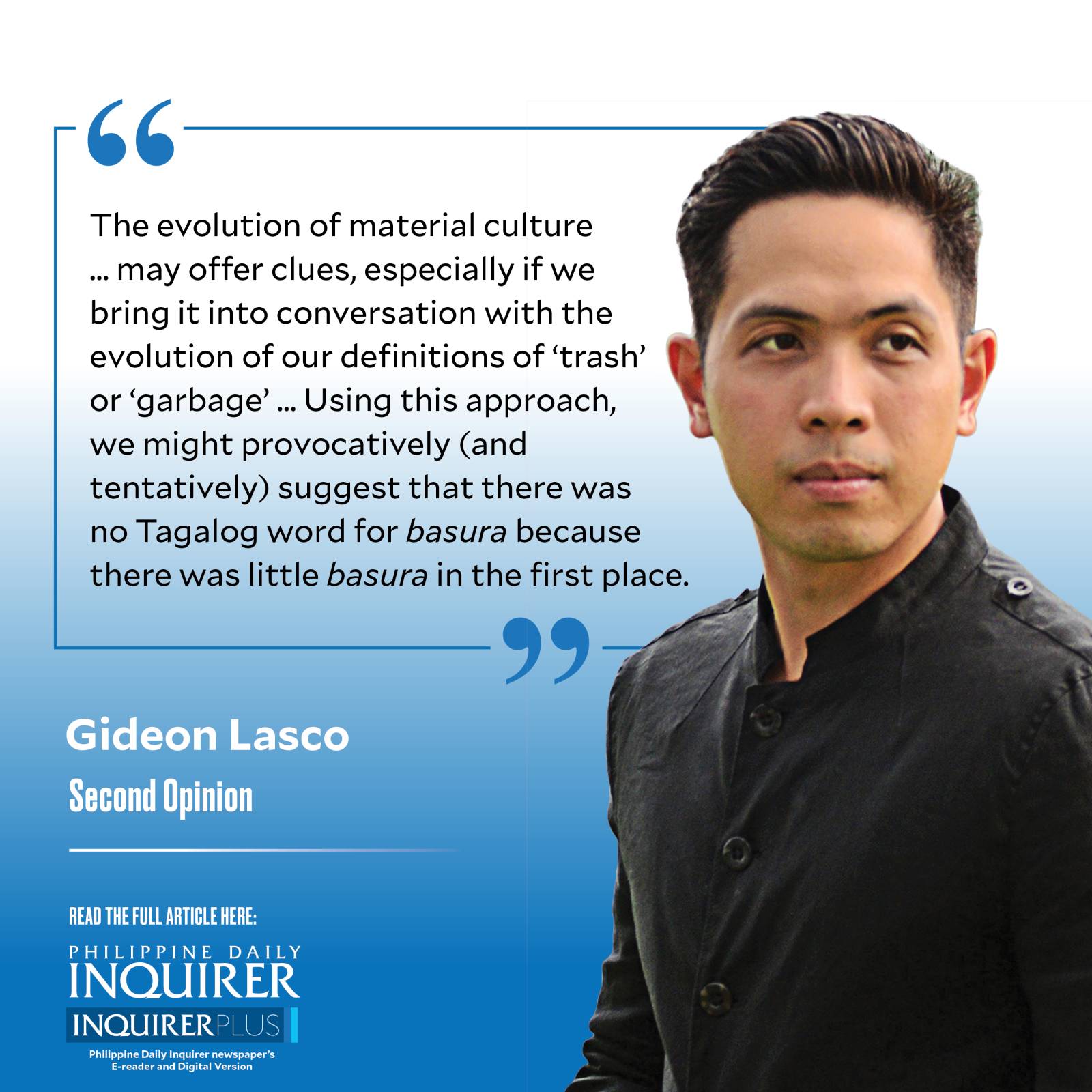‘Basura’ thoughts

I didn’t realize that “basura” was a Spanish word until I started learning Spanish in Instituto Cervantes, then located in Kalaw; eventually, as I traveled across Spain and Latin America, and especially when I lived in Mexico City and Bogota, basura would figure in various quotidian phrases that Filipinos can easily understand through context clues, for instance, “no tirar basura en la calle.”Of course, we have so many Spanish loan-words in most of our languages—from “almusal” to “sapatos”—but what’s fascinating is how some of these words actually date the arrival of certain things. We have precolonial words for dogs and cats because we actually had “aso” and “pusa” before the Spanish period, unlike “caballo” and “vaca.” (For cows, check out Scott 1990; for horses, see Mackie 1916, which cites Muslim Mindanao as an exception).
Why don’t we have pre-hispanic, Tagalog word for basura? Of course, there are related terms like “kalat,” “dumi,” or “tapunin,” but they are imprecise (unlike “aklat” which is synonymous to “libro”). In any case, the fact that basura has been our default, at the very least, calls attention to the historicity of garbage.
The evolution of material culture (that is, the things we use in our communities, houses, and everyday lives) may offer clues, especially if we bring it into conversation with the evolution of our definitions of “trash” or “garbage” (Interestingly, in the United States, “trash” and “recycling” have become two different categories in everyday usage; the latter is not just a category of the former).
Using this approach, we might provocatively (and tentatively) suggest that there was no Tagalog word for basura because there was little basura in the first place. If you’re using coconut leaves as roofs, banana leaves as plates, rattan handicraft as containers, there was nothing that needed to be disposed of in a special way. Everything was biodegradable, save for valuables—gold, jewels, textiles—that did not amount to a scale that caused problems.
This is true for the whole world; for much of human history waste was a public concern, mostly in relation to disease, hygiene, and sanitation. But the Philippines has been particularly “sustainable,” given its political, cultural, and environmental contexts—for instance, the relative abundance of food and year-round warm weather that did not necessitate large construction projects.
The interrelated processes of colonialism, industrialization, and capitalism have drastically altered the quality and quantity of “basura”—alongside transforming our needs and wants. Filipinos have long been avid and frequent bathers, but while the epic hero Labaw Donggon would have simply bathed in the river Halawud and lathered his hair with “gugo,” many Filipinos today would not shower without sachets of soap, shampoo, conditioner, and so much more. And while we can surmise that Rizal would have carried “kakanin” wrapped in banana leaf in his climb up Mount Makiling (see “The mountains of Jose Rizal,” 12/27/18), today’s hikers—myself included—are guilty of having to buy a bevy of products.
The most emblematic material of our age, of course, is plastic.
Interestingly, plastic was once hailed as an environmental solution, as a substitute to ivory and other materials, which required hunting down elephants, turtles, and other poor animals. Indeed, for the first half of the 20th century, people viewed it optimistically, in the words of anthropologist Saskia Abrahms-Kavunenko, “as an artificial substance unbounded by typical material constraints.” The global popularity of Tupperware from the 1960s onwards perhaps typified the moment when plastics could still represent something good.
Since the first plastic debris showed up in the oceans in the 1960s, the recognition of plastics as a problem has grown, alongside its pernicious spread around the world, and today they are found in our environment, not just in our oceans (e.g., the Great Pacific Garbage Patch), rivers, and mountains, but (as micro- and nanoplastics) within animals, plants, the air we breathe, and within our bodies—from bloodstreams to airways and even in breastmilk, posing not-fully-known threats to public health.
Such recognition has rightfully been taken up by citizens and governments around the world who have made individual and collective steps to reduce plastic use, from clean-up drives to plastic-free ordinances and the pursuit of better recycling technologies. Especially in this season of mass consumption, environmentalists are “dreaming of a less wasteful holiday.”
But while we are all complicit in the “plastics pollution crisis,” I lay the blame unequivocally on the producers and large corporations who manufacture and market these products, earning enormously in the process. As the indigenous scholar Max Liboiron, wrote in “Pollution is Colonialism,” responding to the now-routine headlines of countries like the Philippines being the world’s biggest plastics polluters: “Reports like these reproduce the erroneous truism that plastic pollution is a consumer problem rather than an industrial production problem.”
—————-
glasco@inquirer.com.ph




















